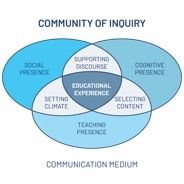
Top stories






More news


Marketing & Media
Ads are coming to AI. Does that really have to be such a bad thing?














In the wake of Covid-19, where digital learning solutions are becoming even more prolific, social learning continues to gain traction.
While collaborative learning is not a new concept, edtech specialist Edge Education says in order to maximise how we learn in the 21st century and beyond, educational culture must shift from an individualistic to an inherently social approach.
“Decisions surrounding the inclusion of social learning tend to be binary in nature - either on/off or collaborative/non-collaborative,” says Fourie. “What’s more, social learning tools and technologies - such as chats, forums or wikis - are often considered an afterthought to the overarching learning design.”
According to Fourie, a step in the right direction involves making social learning tools a key aspect of the learning design of online educational experiences.


Specialist academic educator, Jana Eicher, says that the ‘social factor’ is deep-rooted in the way we receive and process information. She illustrates this by looking at four key theories on how learning takes place.
Behavourists view learning behaviours as a result of responses to external stimuli in the environment. “For example, where an educator uses prompts to obtain expected outputs from learners, these are essentially social in nature,” says Eicher.
Cognitivists, on the other hand, argue that a learner’s mental processes of storing and retrieving information are the key area of focus. Occurring in response to environmental stimuli (such as engagements with peers and educators), Eicher says they too are socially motivated.
Like cognitivism, constructivists believe that learners subjectively give meaning to their environment, and consolidate resulting new knowledge with what they already know. “This takes place as a result of continuous reflection - a private activity - and collaboration - a social activity,” she says.
According to connectivists, we continuously acquire knowledge by connecting different sources of information. “In this scenario, the role of the educator is to connect curious learners with inquiring minds to networks of peers and of knowledge, which is another social process.”
Eicher says that the link between social learning and these four theories is their agreement that learning doesn’t occur in a vacuum, and is significantly enhanced by social factors.

In order to understand how social e-learning experiences can benefit higher education, Edge Education CEO Dr Andrew Hibling refers to a community and inquiry-based approach called the Community of Inquiry framework. It focuses on the intentional creation of an online learning community, with emphasis on establishing deep and meaningful learning experiences through the development of three connected elements; social, cognitive and teaching presence.
“Meaningful community reflection and engagement are achieved through engagement with participants (social presence), engagement with content (cognitive presence), and engagement with regard to the goals and direction of learning (teaching presence),” says Hibling.
“This approach is therefore social by its very nature. But rather than serving as an afterthought, social learning is central to the design of the educational experience.”
Hibling says that the answer lies in making community – with its social interaction, collaboration and discourse – central to the learning design of academic courseware.
He argues that in the e-learning space, content is overabundant but this paradoxically renders it insufficient for deep and meaningful learning. “However, when integrated with socialisation, content can become a channel for dialogue, as the development of social, cognitive and teaching presences is enabled. This can lead to reflection and, ultimately, deep and meaningful learning.”
With this in mind, Edge Education has developed its multimedia-rich digital course book aimed to provide an online learning experience which is both community- and inquiry-based.
Engaging not only digital but also socialisation elements, students have instant access to a community space, enabling them to engage in sustained, purposeful discourse and reflection, and to collaboratively reinforce their understanding with other community members.
“The functionality also allows learners to create multiple communities that facilitate inquiry at various levels, from communities including all institutional members to smaller focus groups,” says Fourie.
“In this way, social learning - and more specifically community- and inquiry-based learning - is inherent to its very design, allowing the age-old means of knowledge transaction to take centre stage once again,” concludes Hibling.